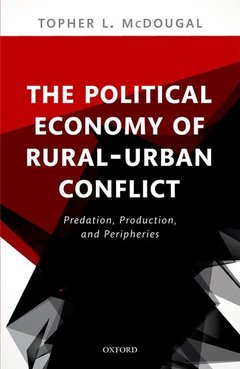The Political Economy of Rural-Urban Conflict Predation, Production, and Peripheries
Langue : Anglais
Auteur : McDougal Topher L.

In some cases of insurgency, the combat frontier is contested and erratic, as rebels target cities as their economic prey. In other cases, it is tidy and stable, seemingly representing an equilibrium in which cities are effectively protected from violent non-state actors. What factors account for these differences in the interface between urban-based states and rural-based challengers? To explore this question, this volume examines two regions representing two dramatically different outcomes. In West Africa (Liberia and Sierra Leone), capital cities became economic targets for rebels, who posed dire threats to the survival of the state. In Maoist India, despite an insurgent ideology aiming to overthrow the state via a strategy of progressive city capture, the combat frontier effectively firewalls cities from Maoist violence. This book argues that trade networks underpinning the economic relationship between rural and urban areas - termed 'interstitial economies' - may differ dramatically in their impact on (and response to) the combat frontier. It explains rebel predatory tendencies towards cities as a function of transport networks allowing monopoly profits to be made by urban-based traders. It explains combat frontier delineation as a function of the social structure of the trade networks: hierarchical networks permit elite-elite bargains that cohere the frontier. These factors represent what might be termed respectively the 'hardware' and 'software' of the rural-urban economic relationship. Of interest to any student of political economy and violence, this book presents new arguments and insights about the relationships between violence and the economy, predation and production, core and periphery.
Topher McDougal is Associate Professor in Economic Development & Peacebuilding at the Joan B. Kroc School of Peace Studies at the University of San Diego. He is also Research Affiliate at the Centre on Conflict, Development, & Peacebuilding (CCDP) at the Graduate Institute for International & Development Studies and a Principal of the Small Arms Data Observatory (SADO). His research focuses broadly on the microeconomic causes and consequences of armed violence, including rural-urban trade patterns in conflict-affected societies; detection and quantification of illicit trades, especially in small arms; and costs of conflict.
Date de parution : 04-2017
Ouvrage de 230 p.
16.2x24.1 cm
Disponible chez l'éditeur (délai d'approvisionnement : 21 jours).
Prix indicatif 95,31 €
Ajouter au panierThèmes de The Political Economy of Rural-Urban Conflict :
© 2024 LAVOISIER S.A.S.



